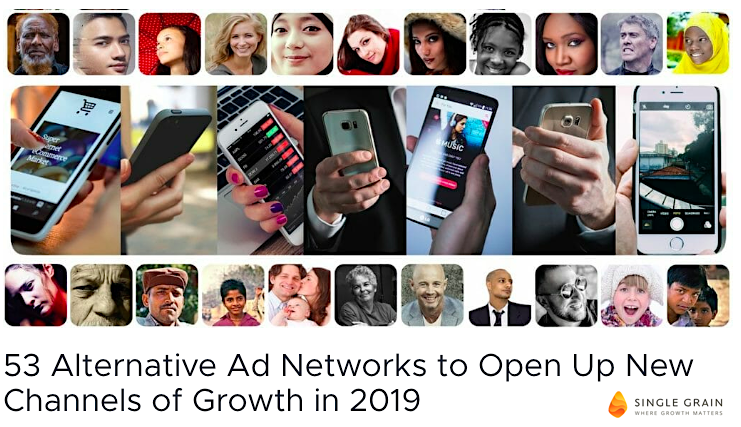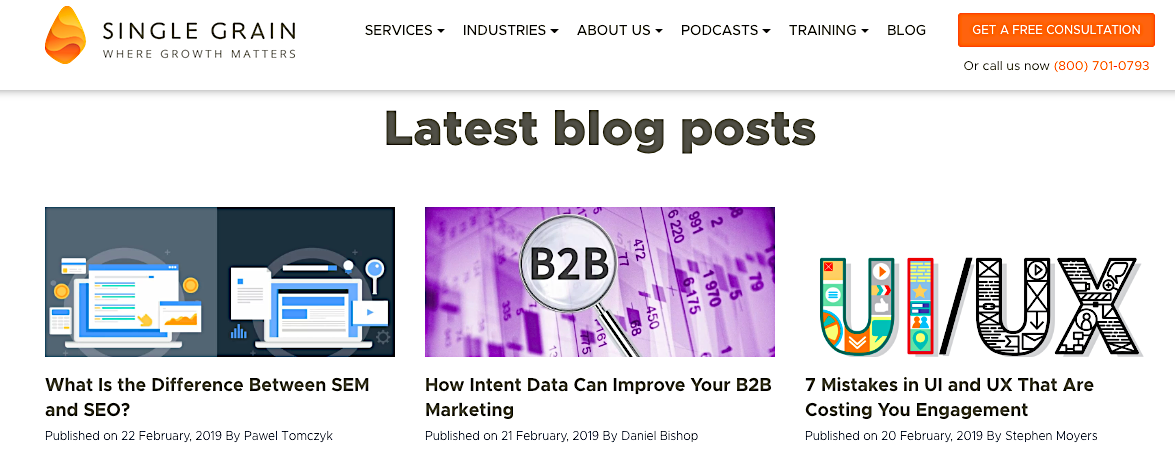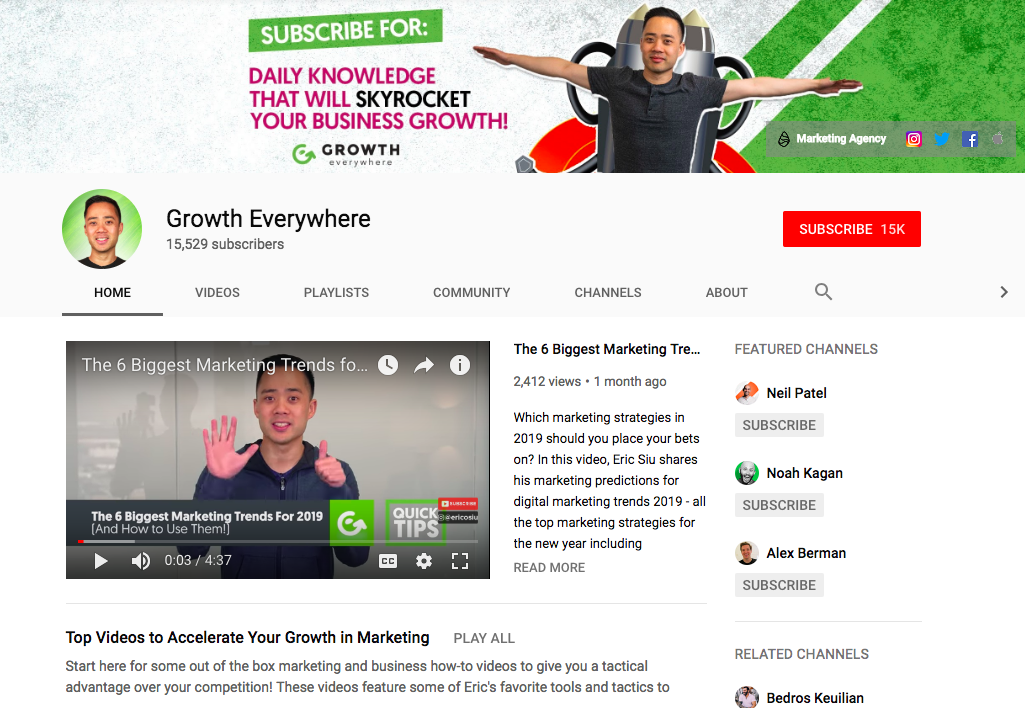As we enter another year, updating our marketing for emerging trends must take precedence. Today I will be looking at where to place your funnels to take advantage of both the best paid and organic search channels.
How many lead avenues do you need and where are your best opportunities? How do you adjust to the 2019 marketing landscape when modern consumer behavior is constantly changing? Let’s dive in.
How Many Is too Many Channels?
The first thing to look at is whether it’s possible to spread yourself too thin. Often, marketers try to tackle every lead avenue in a “throw everything at the wall and see what sticks” strategy. Is it possible to establish a presence in too many, or too few, search channels?
The first step in your strategy to increase organic search traffic is to determine where you’re stepping from — that is, where does your business stand today? Should improving your existing content take precedence?
My Case Study: Single Grain
As an example, when I started out with Single Grain, we only had 4,000 visits per month on our blog. When I took over, my first goal was to focus on creating better content. That’s it. No Facebook Ads, no Google AdSense. Just better, longer-form content.

It’s easy to forget that content is king. It’s not just a cliché. All the marketing proverbs surrounding content are true, and before even establishing a single funnel, it’s important to reach a point where your content is ready for the primetime.
The thing is, focusing on content first has key advantages. If you don’t have an audience yet, it’s okay to fail. It’s okay to make mistakes. Dust yourself off, learn, and understand that the damage done is minimal. Would you rather make mistakes with an audience of a couple thousand or your dream audience of a couple hundred thousand?
The more obvious advantage is that once you’ve really nailed your processes, you can be more efficient. Your content creation can go on autopilot to an extent. Your business has built up a sort of high metabolism, and you can focus on marketing much more easily.
It’s like how riding a bicycle can become second nature. You don’t really need to exert a lot of thought and effort into it once you’ve mastered it.
Establishing a presence in search channels without strong content isn’t like riding a bike for the first time; it’s more like trying to ride a bike you haven’t put together yet. Click To Tweet
Don’t Neglect the Less Exciting Basics
Before searching for new marketing channels for direct traffic, be aware that what people longed for in 2018 is still largely missing: personal connection in almost every social channel.
Everyone is inundated with constant notifications and search ads from the myriad networks, both professional and casual. Therefore, forget about analytics, digital marketing channels and organic marketing for a second. Instead, understand that taking the time to cut through the noise with campaigns that are unique with something that says “I paid attention to you” works.
Yes, I’m talking about a cold email marketing strategy. In today’s world, however, they might as well be called warm emails. Carefully crafting a message that is unique and offers something special is increasingly important in order to distinguish yourself from all the formulaic marketing.
This is something I did when I was in my mid-20s when I was first setting up shop. I’d spend 20 or 30 minutes doing an analysis on a website I wanted to collaborate with. After 20 or 30 minutes a day—do the math—I was tired. But people opened them back then and we got clients.
If you don’t think that works even better today than it did for me when I was young, you’re not paying attention to modern trends. Despite being more connected than ever with social media, people feel more disconnected. This is not only a prime opportunity, but an unusual case of an old tactic becoming more and more valuable over time.
Of course, this kind of marketing strategy takes time, but it’s a natural step after your content is solid. It’s also a great way to begin networking if you feel that, no matter how well you’re performing, your business is missing those special connections. Besides, even a successful business should never stop shooting for the stars.
Learn More:
Establishing Your Channels, The Free Way
Let’s say that everything I talked about above checks out for you: you’ve got a solid content creation machine going, and you’re doing the old tactics like cold emails that are more important than ever. What’s next?
First, forget about the platform itself, per se. Your first goal is to establish a community. In doing so, you need to find the best platform for you to engage viewers in discussions about your product.
The Addictive Nature of Facebook Groups
For most, the best platform is going to be Facebook Groups for a key reason: they’re engaging. People love interacting with Facebook Groups because they offer a component that’s largely missing from the rest of the site, and that’s the ability to talk with others connected by a common bond.
Most of the time, people interact with people they already know on Facebook, but Groups are different. Here’s why:
- Free Advertising. Not only are they naturally engaging, but Facebook understands this and right now Groups are experiencing heavy promotion. Their algorithms have been tweaked to push Groups to the top of user feeds.
- Start Out Unique. How do you get an audience?
If I were starting from scratch, the most novel way to build an audience would be to use Facebook Live in tandem with Facebook Ads. Click To Tweet
You can even target those who viewed your Live video to draw them back in. Getting eyes on a Live video is relatively inexpensive, and people love video. The liveness adds a sense of urgency.
- Self-Perpetuation. It will take a few months of interaction on your part, but eventually, your group will self-perpetuate. Users will interact with each other, share content, and so on — all in your controlled environment.
- Capturing Data. I know what you’re thinking: you want control over the platform. That’s okay. Once your Group is full of an engaged audience, you can focus on capturing data through webinars or other sources. Redirect them to websites with free content in exchange for an email. Whatever works for you.
YouTube Live: Same Story, Different Platform
What do Facebook and YouTube have in common? They’re both eager to build a wide moat around their user base. Even though YouTube is fundamentally built on video content, like Facebook it promotes live content to keep itself fresh.
What does this mean for you? It means that, first of all, the algorithms that drive search on YouTube are prioritizing live content, giving you an automatic edge.
Look at it this way: if you’re going to make video content, just do it live. What do you have to lose? Virtually any video that could be done for your business could be done live.
Likewise, advertising for live videos is extraordinarily cheap right now. Spend a minimum of $50 on each live video. Just like Facebook Live, you can retarget viewers later to get subscriptions from them.
Dive Deeper: How to Use Live Video (Facebook & Instagram) to Grow Your Business
The Limits of Legacy: How Long Will Facebook and YouTube Matter?
Live video content on both networks is incredibly important for 2019, but be sure to capture as much user data as possible. No one can foretell when a network will experience a downturn.
That said, it is more likely with Facebook (and, by extension, Instagram) than with YouTube. YouTube is owned by Google, and YouTube is second only to Google Search by search volume.
Regardless, your ultimate goal is to capitalize on current trends, get what you need, and grow your business. Use that growth to nourish all your platforms.
Learn More:
Other Search Channels for 2019
While Facebook and YouTube are top choices due to their big push for organic traffic to your live content, there are several other great routes worth exploring.
Podcasts
The statistics behind how people are interacting with podcasts are amazing:
- 80% of listeners listen to all or most of each podcast episode
- People listen to an average of seven shows per week — that’s one a day!
- 26% of people listen to podcasts at least every month
- Podcast listeners subscribe to an average of 6 shows
Combine the loyalty of listeners, the addictive nature of podcasts, and explosive growth in popularity, and you’ve got one heck of an opportunity. There are many serious advantages here.
Eager Audience
It’s easy to promote podcasts, simply because content typically comes out weekly. Most shows last an hour or less. This leaves consumers actively looking for new content.
Captive Audience
Whether listening to a podcast in the car during a commute (22% of people listen to a podcast while driving) or putting it on to clean the house, listeners are much more captive than they would be with other forms of media. A YouTube video is one click away from losing a pair of eyeballs, but podcast listeners listen passively while doing other things.
Superb Demographics
While podcast demographics don’t skew enough from the general population to be inaccessible to anyone, there are some key takeaways about podcast demographics that should excite many business owners:
- 45% of monthly podcast listeners boast an income of over $75k, compared to 35% for the general population
- 27% of podcast listeners in the U.S. have a college degree, compared to 19% for the general population
- 94% of podcast listeners are on social media, compared to 81% of the general population
- 69% agree that podcast ads inform them of new services and products
- Podcast listeners follow brands and companies on social media more than the general population
- Podcast listeners are more likely to subscribe to streaming services — meaning they’re less exposed to TV or radio advertising
Clearly, the explosive growth of podcasts represents a unique opportunity if seized upon before the market becomes oversaturated.
Learn More:
Cross-Leverage Your Content for Superior Results
Luckily, creating a podcast isn’t that difficult. After all, I’ve already suggested using live video, so creating a podcast is as simple as polishing up your transcript. Alternatively, you can write your podcast first, and then use that as the foundation for your live videos, allowing you to speak more naturally if you’re not used to speaking live.
For inspiration, check out my Growth Everywhere podcast and my Marketing School podcast (with Neil Patel).
Crowdsourcing
The gig economy has become a buzzword, and with more and more emphasis, everyone is turning to sites like Upwork, a freelance platform, to make their search for job fulfillment easier and more standardized. It works for large companies looking to cut costs, and it works for small companies who don’t have an HR department.
Depending on what your service or product is, find ways to take advantage of the gig economy. If you’re just starting out, it makes perfect sense to undercut the competition. It’s a kick-down-the-door approach that immediately makes you stand out.
Don’t forget that when we talk about search, sites like these host a massive amount of data that can be difficult for engines like Google to find. They’re their own shielded ecosystem in a sense, and anyone on these sites is bypassing Google anyway.
This is no small drop in the bucket, either. Looking at Upwork alone, there are 12 million registered freelancers along with five million clients. Business is done on the site to the tune of $1 billion.
That’s a whole group of professionals who aren’t using Google for their professional needs unless they have to. Why would they? They have a vast network right where they conduct business, and whatever social media network they’ve developed from this.
Learn More:
Putting It all Together
What hasn’t changed from one year to the next is the need to always assess where your business stands. The needs of an entrepreneur fresh out of school with no experience will be very different from a 10-year-old company seeking to adapt their practices.
The greener you are, the more you’ll have to earn experience before you have things to talk about and share. It’s not easy but bear in mind that you’re not the first. Everyone — literally everyone — has been there before.
Existing businesses need to balance their strategies. 2019 is shaping up to be an interesting year, with old players like Facebook and YouTube dominating trends, but the gig economy and interesting factors like podcasting are rising like glaciers on the horizon. It’s doubtful that we’ll see a digital version of old analog forms of work and entertainment sink major platforms, but the desire to connect with others legitimately grows ever stronger despite our being smack-dab in the middle of the “social media age.”
In 2019, the successful business is one that masters a social media presence with legitimate content and the warmth customers crave.